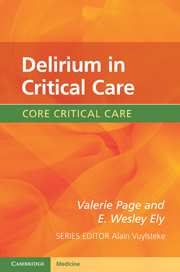Book contents
- Frontmatter
- Contents
- Foreword
- Delirium, a patient testimony
- 1 What is delirium in critical care?
- 2 How common is delirium in critical care?
- 3 What does delirium look like in critical care?
- 4 Delirium in critical care: how does it happen?
- 5 Delirium: what causes it? Risk factors
- 6 Delirium in critical care: why is it important?
- 7 Delirium in critical care: how do we diagnose it?
- 8 How to prevent delirium?
- 9 Treatment of delirium in critical care
- 10 Mental capacity and restraints
- 11 End-of-life care
- 12 What is the future?
- Selected references
- Index
Foreword
Published online by Cambridge University Press: 05 December 2011
- Frontmatter
- Contents
- Foreword
- Delirium, a patient testimony
- 1 What is delirium in critical care?
- 2 How common is delirium in critical care?
- 3 What does delirium look like in critical care?
- 4 Delirium in critical care: how does it happen?
- 5 Delirium: what causes it? Risk factors
- 6 Delirium in critical care: why is it important?
- 7 Delirium in critical care: how do we diagnose it?
- 8 How to prevent delirium?
- 9 Treatment of delirium in critical care
- 10 Mental capacity and restraints
- 11 End-of-life care
- 12 What is the future?
- Selected references
- Index
Summary
The identification of delirium as an important entity in acutely and critically ill patients has been one of the major advances in intensive care over the last decade. There is increasing recognition that the condition has an important impact on morbidity, health economics and patient outcome, not just in critical care, but also in the perioperative period, during acute medical illness, and at the end of life. However, there has also been a realization that the condition is under diagnosed, and that its prevention and treatment are frequently neglected. Given this context, this book is a welcome resource for clinicians who are involved in treating patients who are at risk of delirium or require treatment for the condition. The authors are practising clinicians with complementary backgrounds in critical care. Professor Wesley Ely is perhaps the best recognized expert in this field worldwide; whose publications have put delirium on the critical care agenda. Dr Valerie Page runs a busy general intensive care unit and brings her experience of everyday critical care to the problem, along with knowledge of the background literature. While this book does provide some information on the clinical science and neurobiology underpinning the condition, this is not its main attraction, and there is a refreshing candour about the substantial and large lacunae in knowledge about delirium. Its great strength lies in its practicality, and in the robust clinical sense that it displays in guiding the practising ICU doctor or nurse through the process of detecting, classifying, quantifying, preventing and treating delirium.
- Type
- Chapter
- Information
- Delirium in Critical Care , pp. ix - xPublisher: Cambridge University PressPrint publication year: 2011
- 1
- Cited by

